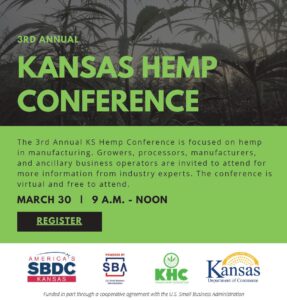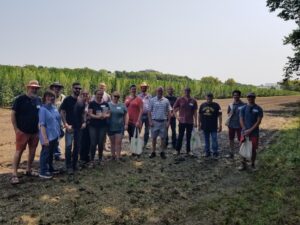Final report for FNC21-1307
Project Information
The KS Fiber Hemp Variety Trials expanded beyond the original research proposal. In addition to fields planted by Harry Dawson, Jake McClure and Troy Palmer, two other Kansas farmers agreed to participate in the research and data collection as the season progressed. Funding allocated for seed went further than originally planned as well. Where 63 acres was originally included in the research, 128 acres of hemp was planted and added to data collection spreadsheets. With the expanded acreage, six hemp seed varieties went in the ground for comparison instead of the 3 originally proposed.
The additional acreage now included in the research, allows us to study success in another region of the state. Hemp fields in north, central and southern Kansas provide opportunity to understand the effects of varying rainfall totals and weather. Two farmers planted with a 30 foot drill on 7.5 inch centers. One farmer planted with 30 inch rows with a planter.The remaining farmer planted with a no till drill. Also, rain delays resulted in a planting window of more than 30 days. By the season's end, we will better understand optimal planting dates and their impact on the crop.
The farmers and respective farms involved in the proposal hope to promote the growth of the fiber hemp industry in Kansas. Working together to purchase seeds, farmers will plant each variety across various soil types on irrigated and non-irrigated land using traditional and no-till techniques. Grant money will be used to purchase seeds, pay a portion of each hemp license fee to the KS Department of Agriculture, test the soil and pay a stipend to each farmer.
Hemp will be retted in the field and baled for transport to a decortication facility under construction in Augusta, KS. Knowing they have a buyer for the fiber hemp they grow, encourages these farmers to be involved. Growing three different varieties of fiber hemp allows the decortication facility to determine the best genetics for processing and future manufacturing.
The proposed study is foundational to establishing a bank of knowledge for hemp production in Kansas and the central plains. Today, little information is available for hemp producers to make decisions. The knowledge gained from this variety trial will help inform producers and provide valuable information to processors who are essential to create a robust hemp industry with long term benefits for agriculture.
- Evaluate production for 6 varieties of fiber hemp on irrigated, tilled land in sandy loam soil
- Evaluate production for 6 varieties of fiber hemp planted on irrigated, untilled, clay soil with native grasses
- Evaluate production for 6 varieties of fiber hemp on tilled, dry land with clay soil
Cooperators
- - Producer (Researcher)
- - Producer (Researcher)
- (Researcher)
Research
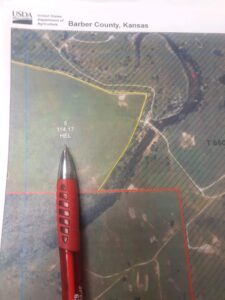
At Dawson Ranch (Farm 407 Tract 660 - identified above) 30 tilled acres under center-pivot irrigation will be used to plant three fiber hemp varieties. Each 10 acre section will be alternated with Sudan grass. Field trials comparing the three seed genetics will analyze yields on tilled, irrigated, sandy loam soil.
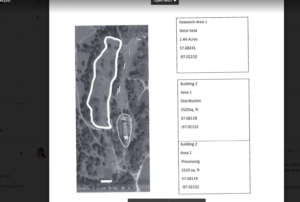
Palmer Ranch (Research Area 1 pictured above) will conduct yield studies on 3 fiber hemp varieties of 1 acre each planted on untilled, irrigated, clay soil with native grasses. Together with Troy Palmer, Sarah Stephens and Leah Dannar-Garcia will put hemp production knowledge to work to study yields with the no-till technique.
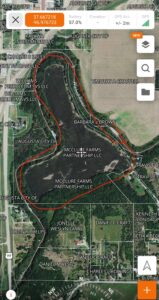
The McClure Farm (pictured above) has a rich tradition of row crop farming for soybeans, wheat, corn and milo grown on dry land. Soil in the area is mostly clay. Trials on this farm will support research of yields from tilled, non-irrigated fields with 3 genetic varieties grown on 10-12 acres each.
Important outcomes of this research include a growing network of hemp producers and ancillary business owner interest. Educational events and knowledge centers play a crucial role in building the momentum needed for industrial hemp to become a traditional commodity. Convincing the general public that plants grown for cannabinoid production are wholely different than grain and fiber varieties requires ongoing information campaigns that enlighten and engage.
Throughout the 2021 industrial hemp season, data was collected and measured using an online Google Sheet. Transferred here to a conventional spreadsheet, the SARE 2021 Industrial Hemp Research includes details on each of the varieties and each of the producers. Varietal details include factors specific to the seed and recommended planting techniques. Producer information tracks differences in soil type, precipitation and equipment involved. Tracking data and comparing these details built familiarity with the timing and techniques that are ready for refinement.
Regulatory restrictions continue to hamper the development of industrial hemp in Kansas and the midwest. With licensing fees among the very highest in the country and a cut-off date of March 15th to apply for an annual producer's license, production and family farms across the state are skeptical about the crop's potential. Connecting producers with resources to remove some of the risk and the red tape has allowed this group to plant the seeds of the hemp industry in the region.
Educational & Outreach Activities
Participation summary:
Throughout the year, Kansas Hemp Consortium hosted several events to increase awareness and industry knowlege of industrial hemp. All events were free to attend and available online when possible. Collaborative efforts pulled together industry experts from Kansans for Hemp, Kansas Department of Agriculture, Kansas State University and other influencial organizations.
The Kansas Hemp Consortium hosted the 3rd Annual Kansas Hemp Conference virtually on March 30, 2021. The line-up of speakers included Dr. Jason Griffin, Industrial Hemp Researcher and Director of KSU's Pair Horticulture Center, Dana Ladner (KDA's Compliance, Education and Agency Support Program Manager), Kelly Rippel (Kansans for Hemp), Laura Drotleff (Hemp Industry Daily), Sam Spallitta (Human Plant Solutions), Joel Leftwich (Kansas Farm Bureau) and Landon Oldham (Heartand Soil Services).
The virtual conference was free to attend and open to the public. It was advertised to licensed growers and ancillary businesses through a Facebook event, email blasts and on the WSU-SBDC website. The conference was recorded and remains available for viewing on YouTube. More than 120 viewers watched live and many more have viewed the recording.
3rd Annual Kansas Hemp Conference YouTube Recording: https://youtu.be/dosZ9j_HDAg
3rd Annual Kansas Hemp Conference Flyer
Hutchinson News: https://amp.hutchnews.com/amp/4807900001?fbclid=IwAR3ubcsEJWuoLerW4ox5sih_ia1aVGsaD_Y7sckhRS2Hu6uw6BlLDX-pd-k
Lunch & Learn Lecture with Heartland Soil Services: https://www.youtube.com/watch?v=KIQBlCTOYRY
Guest Blog on Kannabis.com: https://kannabis.blog/f/support-kansas-hemp?fbclid=IwAR2UDJ25A70U3qJUnr9t5z-9os33LkvKV6wEYKZj2zPW0xWo-yQF0KVIYyI
Field Tour on August 9, 2021 in Manhattan
Learning Outcomes
Planting dates and weed control far surpassed genetics in overall impacts to the crop. Of the five fields planted, four were total failures. The only successful field utilized a planter on 30 inch rows and cultivated the field twice early in the season. The successful field and farmer also planted earlier than all the unsuccessful farms. Securing genetics in the winter and planting in early spring is important.
There are no approved pesticides or herbicides for hemp today in Kansas. This regulatory approval process is underway and there will likely be options in the not too distant future. The current status makes manual weed control even more critical.
Soil sampling at the participating plots, and the resulting recommendations for ammendments, proved interesting. Since none of the plots produced successful hemp stands, it is impossible to determine the crop's impact on soil health after only one, largely unsuccessful, season.
Heartland Soil Test - ppm-Troy Palmer-Troy Palmer-Research Area 1 SAMPLE
Heartland Soil Test - ppm-Harry Dawson-Dawson Farms-2021
